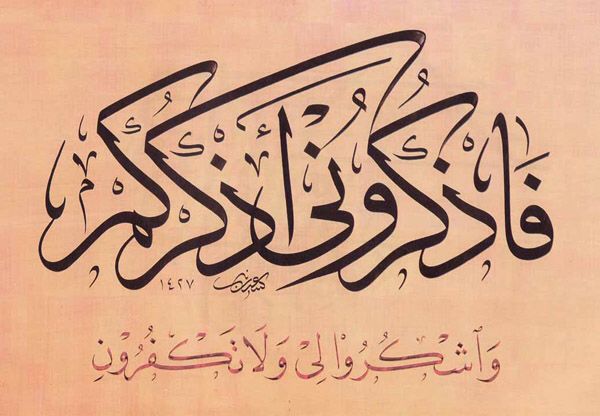بسم الله الرحمن الرحيم
 Praise be to Allah.
Praise be to Allah.
Zamzam is the name of a famous well in al-Masjid al-Haraam [the Sacred Mosque in Makkah], which is thirty-eight cubits away from the Ka’bah. It is the well of Ismaa’eel the son of Ibraheem (peace and blessings of Allah be upon them both), from which Allah quenched the thirst of Ismaa’eel when he was an infant. His mother looked for water for him, but could not find any. She climbed to the top of al-Safaa, praying to Allah to help her and give her water for Ismaa’eel, then she climbed to the top of al-Marwah and did the same. Allah sent Jibreel, and he struck the earth with his heels, and water appeared.
‘Abbas ibn ‘Abd al-Muttalib رضي الله عنه said: “The people used to compete over Zamzam during the time of Jahiliyyah. People who had children used to bring them and give them to drink, and this was their early-morning victuals. We used to used to think that it was a help for people who had children.” Al-‘Abbas (may Allah be pleased with him): “During the Jaahiliyyah, Zamzam was known as Shabaa’ah (satisfaction).”
Imam Ibn Qayyim al-Jawziyah (may Allah have mercy on him) said: “Zamzam water is the best and noblest of all waters, the highest in status, the dearest to people, the most precious and valuable to them. It was dug by Jibreel and is the water with which Allah quenched the thirst of Isma’eel.”
It was reported in Saheeh Muslim that the Prophet (peace and blessings of Allah be upon him) said to Abu Dhar رضي الله عنه who had stayed near the Ka’bah and its coverings for forty days and nights with no food or drink other than (Zamzam): “How long have you been here?” Abu Dharr رضي الله عنه: “I have been here for thirty days and nights.” The Prophet (peace and blessings of Allah be upon him) said, “Who has been feeding you?” He said, “I have had nothing but Zamzam water, and I have gotten so fat that I have folds of fat on my stomach. I do not feel any of the tiredness or weakness of hunger and I have not become thin.” The Prophet (peace and blessings of Allah be upon him) said: “Verily, it is blessed, it is food that nourishes.” (Narrated by Imam Muslim, 2473).
Other scholars added, with their own isnads, “… and a healing for sickness.” This was narrated by al-Bazzaar (1171, 1172) and al-Tabarani in al-Sagheer (295). In Sunan Ibn Maajah (al-Manasik, 3062) it was reported from Jabir ibn ‘Abd-Allah that the Prophet (peace and blessings of Allah be upon him) said: “The water of Zamzam is for whatever it is drunk for.”
The Salaf and ‘ulama’ acted upon this Hadeeth. When ‘Abd-Allah ibn al-Mubarak (Allah have mercy upon him) went for Hajj, he came to Zamzam and said, “O Allah! Ibn Abi’l-Mawali told us from Muhammad ibn al-Munkadir from Jabir رضي الله عنه Your Prophet (peace and blessings of Allah be upon him) said, ‘The water of Zamzam is for whatever it is drunk for.’ I am drinking it to ward off thirst on the Day of Resurrection.” Ibn Abi’l-Mawali is thiqah (trustworthy) so the hadeeth is hasan (good).
Ibn al-Qayyim (may Allah have mercy on him) said:“Myself and others tried seeking healing with Zamzam water and saw wondrous things. I sought healing with it from a number of illnesses, and I was healed by the permission of Allah. I saw someone who nourished himself with it for a number of days, half a month or more, and he did not feel hunger; he performed Tawaf along with the other people just as they did. And he told me that he consumed nothing but Zamzam water for forty days and he had the strength to have intercourse with his wife, to fast and to perform Tawaf numerous times.” Zaad al-Ma’ad, 4/319, 320.
Shaykh Ibn ‘Uthaymeen (may Allah preserve him) said:
“So you should have the intention of what you want to gain by drinking this water. He should drink his fill, i.e., fill his stomach with it until it is filled to the ribs, because this water is good. A hadeeth has been narrated concerning this: the difference between the believers and the hypocrites is drinking one’s fill of Zamzam water.” (Narrated by Ibn Majah in al-Manasik, 1017; al-Hakim, 1/472). Imam Al-Boosairi RH said: this is a saheeh isnaad; its men are mawthooqoon [trustworthy].
This is because Zamzam water is not sweet; it is somewhat salty, and the believer only drinks this somewhat salty water out of faith, believing that there is barakah (blessing) in it. So when he drinks his fill of it, this is a sign of faith. (Sharh al-Mumti’, 7/377, 378, 379).
Perhaps Allah did not make it sweet so that people would not forget that the meaning of drinking it is an act of worship. Whatever the case, its taste is fine and there is nothing wrong with it. We ask Allah to quench our thirst from the Cistern (al-Hawd) of His Prophet on the Day of the greatest thirst. May Allah bless our Prophet Muhammad SAW. Ameen.
The Prophet (blessings and peace of Allah be upon him) described this water itself as: “It is blessed, it (even) serves as food.” Narrated by Muslim (2473). According to a report narrated by al-Bazzar, at-Tabarani, al-Bayhaqi and others, there is the addition, “and a healing for sickness.” See as-Sunan al-Kubra (5/147).
The apparent meaning of the evidence, in sha Allah, is that this barakah is general and applies to all Zamzam water, whether it is in Makkah or has been taken to other countries. Therefore more than one of the scholars said that it is permitted to take Zamzam water out of Makkah and that its barakah and specific characteristics remain even after it has been taken elsewhere.
Shaykh al-Islam Ibn Taymiyah (may Allah have mercy on him) said: “Whoever takes any Zamzam water elsewhere, it is permissible; the salaf used to take it elsewhere.”
Imam As-Sawi al-Maliki (may Allah have mercy on him) said: It is recommended to take it – meaning Zamzam water – elsewhere, and its specific characteristics remain, contrary to the claim of those who say that it loses its specific characteristics. End quote.
Haashiyat as-Saawi ‘ala ash-Sharh as-Sagheer (2/44). Something similar is stated in Minah al-Jaleel Sharh Mukhtasar Khaleel (2/273)
Shaykh ‘Ali ash-Shibraamilsi ash-Shafa‘i (may Allah have mercy on him) said: The words “Zamzam water is for that for which it is drunk” include those who drink it anywhere other than in its location. End quote. Hashiyat Nihayat al-Muhtaj (3/318)
It is sunnah to drink one’s fill of Zamzam water and to quench one’s thirst.
The fuqaha’ have mentioned the etiquette that is mustahab (recommended) when drinking Zamzam water, such as facing the Ka’bah, saying Bismillah, pausing to take a breath three times, drinking one’s fill, praising Allaah after one finishes, and sitting whilst drinking it, as one should do when drinking other kinds of drinks. As regards the hadeeth of Ibn ‘Abbas (may Allah be pleased with him), who said, “I gave the Prophet (peace and blessings of Allah be upon him) Zamzam water to drink whilst he was standing,” (reported by al-Bukhari, 3/492), it is taken to mean that it is permissible to drink whilst standing, and the disapproval of doing so is understood to mean that it is makrooh. The scholars also recommended that the person who drinks Zamzam water should sprinkle some of it on his head, face and chest, make lots of du’aa’ when drinking it, and to drink it for a purpose that will benefit him in this world or the next, because of the hadeeth in which the Prophet (peace and blessings of Allaah be upon him) said: “The water of Zamzam is for whatever purpose it is drunk for.” (Reported by Ibn Maajah, 2/1018; see Al-Maqasid al-Hasanah by al-Sakhaawi, p. 359).
It was reported that when Ibn ‘Abbas رضي الله عنه from the water of Zamzam, he said: “O Allah, I ask you for beneficial knowledge, plentiful provision and healing from every disease.”
Al-Daynoori (may Allah have mercy on him) that al-Humaydi (may Allah have mercy on him) said: “We were with Sufyan ibn ‘Uyaynah (may Allah have mercy on him), and he told us the hadeeth about the water of Zamzam being drunk for whatever purpose it is drunk for. A man got up and left the gathering, then he came back and said, ‘O Abu Muhammad, is the hadeeth which you told us about the water of Zamzam saheeh?’ He said, ‘Yes.’ The man said, ‘Just now I drank a bucket of Zamzam so that you would tell me one hundred hadeeths.’ Sufyan (may Allah have mercy on him), ‘Sit down,’ so he sat down and he told him one hundred hadeeths.”
Imam Ibn Hajar al-Haythami (may Allah have mercy on him) said in Tuhfat al-Muhtaaj (4/144): he may take it back to his homeland so as to seek healing and barakah for himself and others. End quote.
As-Sakhkhawi (may Allah have mercy on him) said: “Some people say that its virtue remains so long as it is still in its original place, but if it is moved elsewhere it changes. But this is something for which there is no basis. The Prophet (blessings and peace of Allah be upon him) wrote to Suhayl ibn ‘Amr telling him: If my letter arrives at night, do not wait until morning, and if it arrives by day, do not wait until evening, before you send me some Zamzam water.”
And in the report it says that he sent him two containers; at that time he was in Madinah, before the conquest of Makkah.
This hadith is hasan because of corroborating evidence. Similarly, ‘Aa’ishah (Allah be pleased with her) used to take Zamzam water with her and she stated that the Prophet (blessings and peace of Allah be upon him) used to do that and that he would carry it in vessels and skins, and he would pour it over the sick and give it to them to drink. If a guest came to Ibn ‘Abbas (Allah be pleased with him), he would honour him with Zamzam water. ‘Ata’ (Allah have mercy upon him) was asked about taking Zamzam water (away from Makkah, after visiting) and he said: The Prophet (peace and blessings of Allah be upon him) al-Hasan and al-Husayn (may Allah be pleased with them) used to do that.
The two angels washed the heart of the Prophet (peace and blessings of Allah be upon him) when he was a child after they had taken it out, then they put it back. Al-Hafidh al-‘Iraqi (may Allah have mercy on him) said: “The reason why the Prophet’s chest was washed with Zamzam water was to make him stronger so that he could see the kingdom of heaven and earth, and Paradise and Hell, because one of the special qualities of Zamzam is that it strengthens the heart and calms the soul. The report about the chest of the Prophet (peace and blessings of Allah be upon him) being washed with the water of Zamzam is proven in the hadeeth of Abu Dharr رضي الله عنه, who reported that the Prophet (peace and blessings of Allaah be upon him) said: “My roof was opened when I was in Makkah, and Jibreel (peace be upon him) came down and opened my chest, then he washed it with Zamzam water. Then he brought a gold basin full of wisdom and faith, poured it into my chest, and closed it up again. Then he took me by the hand and ascended with me into the first heaven.” (Reported by al-Bukhari, 3/429).
There is nothing wrong with selling Zamzam water or transporting it from Makkah.
If Zamzam water is mixed with other water, the mixture will have the barakah of Zamzam as much as the ratio of Zamzam in the water. That is because the person who drinks the mixture will inevitably drink some of the Zamzam water that has been mixed with other water, so it is true to say that he is drinking it. 
Bismillah
1.The Story of how it came to be
This accurate account of the origin of Zamzam holds with it an exquisite message…
Hajar (Alayhis salam) made use of the small amount of food that Ibrahim (Alayhis salam) left for her and her baby, but ran out eventually and was soon thirsty and hungry-her milk dried up, her baby Ismail (Alayhis salaam) became hungry and began to cry. Hajar couldn’t afford to see her son in pain so climbed up the hill which was later called As-Safa, to see if there was anyone on the horizon. She saw no one. She then climbed down, and reaching the valley, ran to the other hill, later called Al–Marwa, doing the same again, all this time her son twisting and turning in hunger. She repeated this seven times, and on the 7th time reached the top of the hill and heard a sound. To her amazement she found it coming from beneath the feet of Ismail (Alayhis salam).
At that point, Jibra’eel (Alayhis salaam) began digging the well of Zamzam from beneath his feet. Hajar was excited to contain the water, it being a desert and so arid and dry-the water would seep into the ground, and she tried making a pool to contain it.
The Prophet (Sallallahu alayhi wasalam) said, (Allah have mercy on the mother of Isma’eel) ”If she had left the water, (flow naturally without her intervention), it would have been flowing on the surface of the earth.”
{Sahih al-Bukhari 3365,Vol. 4, Book 55, Hadith 584}
So because of her efforts to contain the water, Zam-zam amazingly became a well.
Hajar (Allah have mercy on her) before the water was brought out of the ground, running in search, probably heart-broken and crying in pain at the suffering of her son, did not know what Allah was preserving for her in the future. If she knew that a time would come when millions from all parts of the world would follow in her footsteps, she probably may never have cried. And one can only imagine her reward in the hereafter if that were her reward in this world.
So when experiencing challenges in life, remember that Allah may be hiding something for you in your future.

2. Its Names
The names of Zam-zam are many, over 60 according to some experts and scientists, its names derived from its characteristics. Some of the familiar ones are:
- Murwiya (derived from the Arabic word meaning ‘quenched’)
- Shabbaa’a- (derived from ‘satisfying’)
- Maymouna
3. Positive Energy
Within Zam-zam is an ingredient different to other waters, which heals and helps energetic and cell systems within the human body. The German Scientist Dr Knut Pfeiffer,and head of the largest medical centre in Munich, has studied Zam-zam with his colleague and assistant Husam Othman. A miracle in itself is that the Zam-zam specimen they studied still extraordinarily increased dramatically the energetic fields in human cells having travelled from Saudi Arabia to Munich, sustaining climate changes, probably having gone through an X-ray machine at customs, and then being stored for approximately two weeks. The opposite reaction would exhibit with other types of water especially if stagnant for some time, including water from Munich which is considered chemically pure.
The Prophet (peace and blessings of Allah be upon him) said: “The best water on the face of the earth is the water of Zamzam; it is a kind of food and a healing from sickness.” {Saheeh al-Jaami’, 3302}
4. Uncontaminated
Zam-zam has been flowing from the Ka’aba for over 4000 years. Samples taken from all water sources in the world contain some germs in it. Through studies by Doctor Yahya Koshak (expert on Zamzam), it has been proven that Zam-zam does not contain any contaminants. It is an established scientific fact that pools or water wells tend to grow vegetation such as algae– especially in warm climates. Amazingly this is not the case in the well of Zamzam. It has remained free from biological contaminations.
5. Its Purity
Evian – water from the highest part of the French Alps is renowned for its high mineral content and purity, and a high percentage of bicarbonates (357mg/l). Murwiya contains 366mg/l of bicarbonates, and is purer, in fact, the purest water on earth.
6. Healing Nature
Scientific proof shows that Zamzam contains healing components due to its higher content of calcium and magnesium salts and natural fluorides which present germicidal properties.
It was reported in Sahih Muslim that the Prophet (Sallallahu ‘alayhi wa sallam) said to Abu Dhār رضي الله عنه, who had stayed near the Ka’bah and its coverings for forty days and nights with no food or drink other than (Zamzam): “How long have you been here?” Abu Dhār رضي الله عنه, “I have been here for thirty days and nights.” The Prophet (Sallallahu ‘alayhi wa sallam) said, “Who has been feeding you?” He said, “I have had nothing but Zamzam water, and I have gotten so fat that I have folds of fat on my stomach. I do not feel any of the tiredness or weakness of hunger and I have not become thin.” The Prophet (Sallallahu ‘alayhi wa sallam) said, “Verily, it is blessed, it is food that nourishes.”
7. The miracle of its Origin
Mecca is built on a mass of igneous rock, and due to the process in which they form, these rocks have no pores and – due to partial melting of the minerals of which the rock comprises -cause any existing pores to close up. Science tells us that water reservoirs can only exist in rocks that are highly porous and permeable. Geologist Dr Zaghloul Al-Najjar, head of The Committee of Scientific Signs in the Quran and Sunnah states that this simple and great fact verifies the sanctity and holiness of the land.
8. Hadith substantiates its Science
Origins of the water was a mystery until tunnels were dug around Makkah, where engineers and workers found hairline fractures in the solid mass of rock that stretched for kilometres in either direction through which Zamzam was seeping out, extensive fractures which could only be caused by a mighty impact. Sunnah states that it’s because of the strong blow with which Jibra’eel Alayhis salam struck the earth that Isma’eel Alayhis salaam was able to drink.
The well isn’t that deep, 30 metres in fact of which 13 metres or a little less are filled with compressed sediments from the valley which don’t allow water to flow out. Below this is about 17 metres of igneous rock through which the water flows through these long hairline fractures in the rock, where it gains its high mineral content beneficial to both the body and soul of man.
9. It Manifests for what it is Drunk
The Messenger of Allah (peace and blessings of Allah be upon him) said: “The water of Zamzam is for whatever it is drunk for.”
{Narrated by Ibn Majah, 3062}
This is a hasan hadeeth. A myriad of cases exist that testify to the healing nature of Zam-zam. Drinking Zamzam with the sincere intention of fulfilling a need, such as healing a physical ailment, being freed from poverty or distress, even achieving calm in the wake of any type of anxiety, gives way to Allah fulfilling these needs. One could continue drinking it until one is completely healed.
The Prophet (Sallallahu alayhi wasalam) used to wash his chest with Zamzam to gain courage and relieve anxiety through Allah’s grace, before visiting the heavens; he would drink it and use it for Wudhu.
10. Water fasting.
Water fasting isn’t something new and has even been done during the time of the Prophet (Sallallahu alayhi wasalam). Revisit the hadith in point 6:
It was reported in Sahih Muslim that the Prophet (Sallallahu ‘alayhi wa sallam) said to Abu Dhār (Allah be pleased with him), who had stayed near the Ka’bah and its coverings for forty days and nights with no food or drink other than (Zamzam): “How long have you been here?” Abu Dhār (Allah be pleased with him) said, “I have been here for thirty days and nights.” The Prophet, sallallahu ‘alayhi wa sallam, said, “Who has been feeding you?” He said, “I have had nothing but Zamzam water, and I have gotten so fat that I have folds of fat on my stomach. I do not feel any of the tiredness or weakness of hunger and I have not become thin.” The Prophet, Sallallahu ‘alayhi wa sallam, said, “Verily, it is blessed, it is food that nourishes.” {Narrated by Imam Muslim, 2473}
Some of the positive benefits of a 48 hour Zamzam fast are an increase in the number of blood platelets and increased immunity through an increase in white blood cells, as well as a detoxifying effect on the body. Murwiya (Zam-zam) also increases haemoglobin levels, which result in increased energy levels. Testimonials state that these fasts eradicate morning breath, and hunger pangs, also providing a noticeable nourishing effect on the body.
References
http://www.youtube.com/watch?v=VonRItb61sw
http://www.youmuslim.com/video/40975/dr-knut-pfeiffer-islam%20s-zamzam-water-positive-effect-on-human-cells/
http://www.youtube.com/watch?v=cHm2y1mpTLw
“The Book of Zam Zam”, by Doctor Yahya Koshak
http://islamqa.info/en/6831
Authored by Sister “M”
Edited by Noorain Fathima





 I have a question regarding the text Faza’il – e – A’maal by
I have a question regarding the text Faza’il – e – A’maal by Assalamu alaykum
Assalamu alaykum







